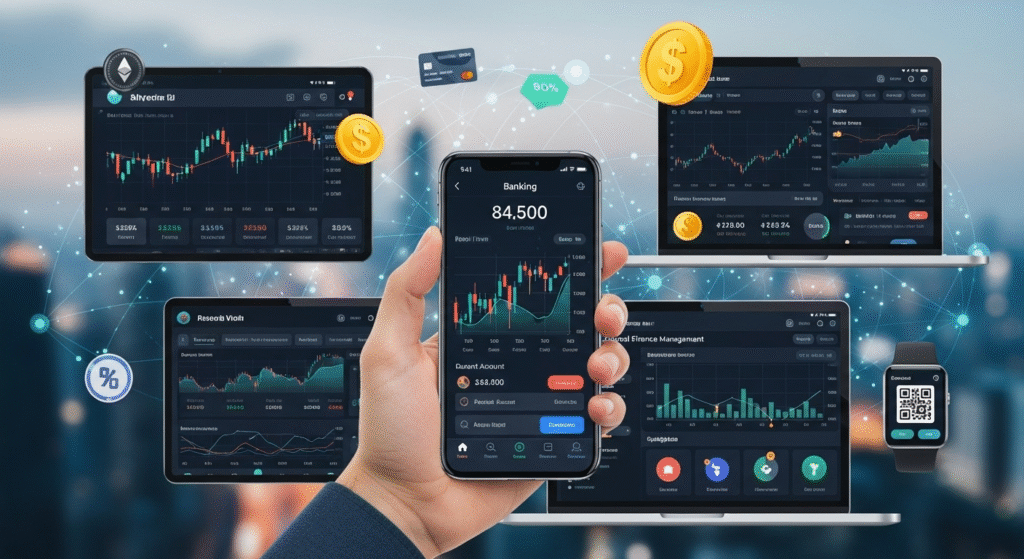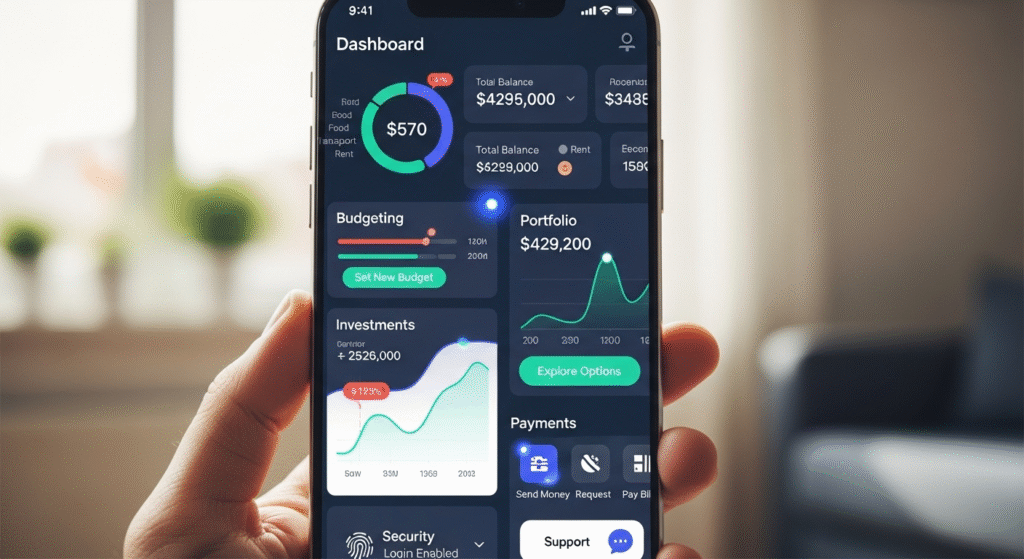
Fintech Apps are changing the way people manage money, save, and spend. With just a few taps on your phone, you can track expenses, set budgets, and even invest smarter. These apps bring technology and finance together to simplify your daily money habits. Whether you’re managing personal finances or small business expenses, Fintech Apps help you stay in control and make informed financial decisions.
In this guide, we’ll explore the Best Fintech Apps for Better Budgeting and Smarter Spending that can help you reach your goals faster. From automating savings to analyzing spending patterns, these apps are your digital partners for a more organized and stress-free financial life.
What Are Fintech Apps and How Do They Work?
Fintech Apps are digital tools designed to simplify how people manage, save, and spend money. They combine financial management with technology, allowing users to control their finances anytime and anywhere. These apps can handle various tasks like budgeting, tracking expenses, saving, investing, and even credit monitoring. The main goal of Fintech Apps is to make personal finance smarter, faster, and easier for everyone—whether you’re an individual, freelancer, or business owner.
Behind every Fintech App is a mix of powerful technologies such as artificial intelligence (AI), automation, and data analytics. AI helps analyze your spending patterns and offers personalized recommendations, while automation ensures bills, savings, and investments happen automatically—without needing manual effort. Data analytics helps provide insights into where your money goes, so you can make informed financial decisions.
By using Fintech Apps, users can save hours of manual calculations and spreadsheets. These apps automatically categorize transactions, send alerts for due bills, and visualize cash flow through charts and dashboards. Many also connect directly to your bank accounts to give real-time updates. This means you can track your financial health on the go and plan better for future goals.
Key Features to Look for in a Fintech App

Choosing the right Fintech Apps can make a big difference in your financial journey. The best apps offer a combination of features that simplify budgeting, track expenses, and improve money habits. One essential feature is expense tracking, which automatically categorizes your purchases so you can see where your money is going. This makes it easier to spot areas where you can save more.
Budgeting tools are another must-have. They help you set financial goals, divide your income into categories (like rent, savings, and groceries), and ensure you stay within limits. Many Fintech Apps also include bill reminders and alerts to help you avoid late payments and penalties. Cash flow visualization through charts and graphs provides a clear picture of your financial situation at any time.
When it comes to safety, strong security features are non-negotiable. Look for apps that offer encryption, two-factor authentication (2FA), and biometric login options. These ensure your sensitive data remains protected. Another important factor is integration—the best Fintech Apps easily connect with your bank accounts, credit cards, and even investment platforms. This provides a unified view of your entire financial landscape in one place.
Best Fintech Apps for Budgeting in 2025

In 2025, Fintech Apps have evolved to make budgeting easier than ever. Three of the best options for personal finance management are Mint, YNAB (You Need a Budget), and Goodbudget. Each offers unique strengths that cater to different financial styles and needs.
Mint remains a top choice for its user-friendly design and comprehensive features. It automatically syncs with your bank accounts, categorizes expenses, and offers insights into spending habits. Mint also provides free credit score monitoring and personalized budgeting recommendations, making it ideal for beginners who want an all-in-one money management app.
YNAB (You Need a Budget) focuses on proactive financial planning. It teaches users to assign every dollar a purpose, ensuring nothing goes to waste. YNAB helps build financial discipline by focusing on saving for future expenses. While it has a monthly subscription fee, its deep customization and practical budgeting philosophy make it worth the investment for serious budgeters.
Goodbudget is a digital take on the envelope budgeting system. It’s perfect for couples or families who prefer to plan their spending manually but digitally. Unlike other Fintech Apps, Goodbudget emphasizes shared budgets, making teamwork easy for joint financial goals.
When comparing free vs paid versions, free apps like Mint work well for basic users, while paid options like YNAB offer deeper insights and advanced tools. The best Fintech Apps for budgeting in 2025 are those that blend automation with financial education, helping users stay consistent and mindful about their money.
Best Fintech Apps for Smarter Spending
While budgeting helps control your finances, Fintech Apps designed for smarter spending help you make the most of every dollar. Apps like PocketGuard, Monarch Money, and Spendee are among the best in 2025 for managing spending efficiently.
PocketGuard automatically links to your bank accounts and calculates how much disposable income you have after essential expenses. Its “In My Pocket” feature shows what’s safe to spend daily, helping users avoid overspending. For people who struggle with impulse buying, this app acts as a real-time financial guardrail.
Monarch Money offers a holistic view of your finances by combining budgeting, goal tracking, and investment insights. It’s ideal for families or professionals who want to manage spending, savings, and investments in one place. Its clean dashboard and powerful analytics make it easy to visualize your spending patterns.
Spendee stands out for its colorful and intuitive interface. It allows users to create shared wallets for household budgets and track expenses in multiple currencies—great for frequent travelers or global families.
These Fintech Apps help users analyze spending habits and highlight areas where money can be saved or redirected. By using smart analytics and automation, they help users stay disciplined while still enjoying flexibility. The biggest advantage of using these Fintech Apps is that they not only track expenses but also teach better financial habits through insights and alerts.
How Fintech Apps Support Saving and Investing?

Fintech Apps are changing the way people save and invest money by making the process simple, automatic, and stress-free. Apps like Acorns, Digit, and Revolut have become popular because they help users save small amounts effortlessly and invest them smartly. These Fintech Apps automate savings by rounding up everyday purchases and depositing the spare change into a savings or investment account. This method makes it easy to build wealth without even noticing the difference in your daily spending.
One of the key strengths of Fintech Apps lies in micro-investing features. Even if you start with just a few dollars, the apps allow your savings to grow over time through diversified investments. Many apps also provide insights and personalized recommendations based on your financial habits. For example, Revolut not only helps you manage your budget but also offers crypto and stock trading options, making it ideal for beginners who want to explore multiple ways of investing.
Another major benefit of Fintech Apps for saving and investing is automation. Once you set your goals, the app automatically transfers funds into your savings or investment accounts based on your spending pattern. This removes the emotional decision-making that often delays saving. The apps track your progress, show potential growth, and motivate you to stay consistent.
Benefits of Using Fintech Apps
There are countless benefits to using Fintech Apps for managing money more efficiently. One of the most important advantages is real-time financial insight. These apps track income, expenses, and savings instantly, giving you a clear picture of your financial health. With Fintech Apps, users no longer need to wait for monthly statements, they can make informed decisions every day.
Another major benefit is how Fintech Apps simplify budgeting for both families and individuals. The apps categorize spending automatically, helping users identify unnecessary expenses and redirect funds toward goals such as emergency savings, debt repayment, or investments. They also offer reminders for bill payments and alerts for overspending, promoting better financial discipline.
Fintech Apps also reduce financial stress. When you have a clear view of your finances, you feel more in control. The automation of budgeting, saving, and investing means you spend less time worrying about money and more time focusing on life goals. Families, especially newlyweds or parents, find these apps helpful for maintaining harmony in financial planning.
Tips for Getting the Most Out of Fintech Apps
To maximize the benefits of Fintech Apps, you need a smart strategy. Start by setting realistic financial goals — whether it’s saving for a vacation, paying off debt, or building an emergency fund. Clearly define your objectives in the app so it can track progress and motivate you to stay on course.
Next, review and adjust your budget regularly. Fintech Apps offer dynamic tracking, so make sure you check reports and insights every few weeks. Your income and expenses may change, and updating these figures ensures your budget stays accurate. The goal is not perfection but consistency — and Fintech Apps make this easy with visual dashboards and notifications.
You can also combine multiple Fintech Apps for complete control over your finances. For instance, use one app for budgeting, another for saving, and a third for investing. This creates a well-rounded system that covers every financial area. Many apps allow integration with banks and other platforms, so you can see all your accounts in one place.
Lastly, take advantage of the educational features most Fintech Apps offer. Many include blogs, spending insights, and goal suggestions that help users improve financial literacy. When used properly, these tools not only organize your money but also teach you how to build wealth long-term. By following these tips, you can make the most of Fintech Apps and achieve smarter, stress-free financial management.
Conclusion
Fintech Apps are transforming how people manage money by combining technology with smart financial planning. They simplify budgeting, saving, and investing, helping users make better financial decisions with less effort. From tracking daily expenses to automating savings and building investment portfolios, Fintech Apps make financial management easy for everyone. By using these tools wisely, individuals and families can gain better control over their money, reduce financial stress, and work toward long-term financial goals. In today’s digital world, adopting Fintech Apps is one of the smartest ways to achieve financial stability and create a secure financial future.
FAQs
Are Fintech Apps safe to use for managing money?
Yes, most Fintech Apps use advanced security features like encryption, multi-factor authentication, and secure servers to protect user data. They comply with financial regulations and security standards to keep your money and information safe. Always choose trusted apps with positive reviews and transparent privacy policies. Avoid sharing login details or using unsecured Wi-Fi when accessing your financial accounts to ensure maximum protection.
Can Fintech Apps replace traditional banks?
While Fintech Apps offer many banking features such as payments, savings, and investing, they don’t completely replace traditional banks. Instead, they complement them by providing faster, more convenient, and tech-driven solutions. Many people use both banks for holding funds and Fintech Apps for tracking budgets, managing investments, or automating savings. Together, they create a complete and flexible financial ecosystem for modern money management.
Do Fintech Apps charge any hidden fees?
Most Fintech Apps are transparent about their pricing. Some offer free versions with basic features, while advanced tools or premium plans may require a subscription. It’s important to read the terms before signing up to understand possible charges, such as transaction fees or subscription renewals. Always review your app settings and notifications to ensure you’re not paying for features you don’t need or use.
Which Fintech App is best for beginners?
For beginners, Fintech Apps like Mint, PocketGuard, or Acorns are excellent options. Mint helps track spending and create budgets easily, PocketGuard keeps you from overspending, and Acorns automates savings and micro-investing. Each app offers a simple interface and user-friendly setup, making it perfect for people new to financial management. Start with one app and gradually explore others as you become more confident managing your finances.
Can couples or families use Fintech Apps together?
Yes, many Fintech Apps offer shared accounts or collaborative budgeting features for couples and families. Apps like Goodbudget and Monarch Money let multiple users track spending, plan shared goals, and manage household budgets together. This makes it easier to stay transparent about money and avoid misunderstandings. Using Fintech Apps as a couple encourages teamwork, better communication, and long-term financial planning for a stronger financial foundation.